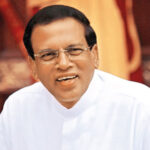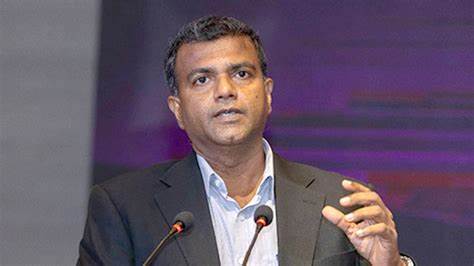
Wide Angle zoom onto Government’s Diplomatic Push Met with Lukewarm Response
- CNL Reporter
- April 28, 2025
- Weekly Political Review
- Deputy Finance Minister Harshana Suriyapperuma
- 0 Comments
Weekly Political Review
Sri Lanka’s Juggling Act: Diplomacy, Trade Tensions, and Political Maneuvers
By Rohana Jith
Sri Lanka’s international diplomacy was in full throttle last week, though it yielded limited results due to the lack of assertiveness from the visiting delegation led by Deputy Finance Minister Harshana Suriyapperuma. Despite multiple engagements with the United States and the Vatican, outcomes remained largely symbolic, as the US response appeared underwhelming and key meetings were missed.
While Sri Lankan officials sought to manage critical economic negotiations abroad, tensions between India and Pakistan following the terrorist attacks in Kashmir threw an additional diplomatic curveball. The Anura Kumara Dissanayake (AKD) administration found itself scrambling to maintain regional balance amid mounting geopolitical uncertainty.
Delay in Kashmir Response Draws Criticism
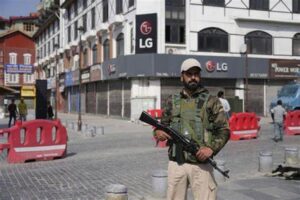
One glaring misstep that caught the public eye was the President’s delayed reaction to the Kashmir attacks. Although the terrorist strike in Pahalgam occurred on Tuesday (22), President Dissanayake only spoke to Indian Prime Minister Narendra Modi on Friday (25). Social media exploded with criticism, noting that former President Ranil Wickremesinghe had already sent a condolence letter nearly two days earlier.
In a curious move, the President’s Office emphasized that the phone call lasted a full 15 minutes, suggesting a need to compensate for the late response. Nevertheless, with India and Pakistan edging closer to open hostility, a larger diplomatic test looms for Sri Lanka.
Trade Talks with the US: A Struggle for Concessions
Meanwhile, Sri Lanka faces the ticking clock of looming US trade tariffs, currently on a 90-day hold. Deputy Finance Minister Suriyapperuma led a special delegation to Washington, DC to seek relief. However, political analysts questioned the decision to send two separate delegations — one for the IMF/World Bank Spring Meetings and another specifically for trade talks — without consolidating efforts.
On Tuesday (22), discussions were held with US Trade Representative Ambassador Jamieson Greer. Back home, President AKD triumphantly announced that talks were “fruitful” and a joint statement with the US was imminent. Yet Deputy Minister Anil Jayantha Fernando later clarified that while discussions had occurred, no engagement took place with more influential figures like US Treasury Secretary Scott Bessent or Vice President J.D. Vance, both seen as pivotal to the tariff issue.
A government-issued statement on Friday detailed that Sri Lanka’s proposals were submitted to Ambassador Greer and later passed on to Assistant Trade Representative Brendan Lynch and Director Emily Ashby — but notably lacked specifics or clear commitments from the US side.
Lack of Clarity Raises New Questions
Political observers pointed out the fundamental miscalculation: dealing with the Trump administration’s trade agenda demands negotiating with Bessent and Vance, not just the Trade Representative’s office. This misstep has led to speculation: what exactly did Sri Lanka propose, and why was the President prematurely promising a joint statement?
Former President Wickremesinghe added his voice to the skepticism, asserting that no agreement had been reached and warning that Washington’s focus remained on resolving trade disputes with larger economies like China before turning to smaller nations like Sri Lanka.
Sri Lanka’s Apparel Sector Braces for Impact

The Joint Apparel Association Forum (JAAF) issued a stark warning: if the reciprocal tariffs are implemented, Sri Lankan apparel exports to the US — a vital revenue source — could drop by at least 25%. This economic strain would come at a time when Sri Lanka’s fragile economy can least afford it, especially with the country already under scrutiny to maintain its GSP+ concessions from the European Union.
Compounding concerns, a high-level EU GSP+ monitoring mission is scheduled to arrive in Sri Lanka from 28 April to 7 May, placing further pressure on the Government to demonstrate political and economic stability.
China Courts Sri Lanka amid Trade Tensions
Amid growing uncertainty, China has stepped in. Following a major strategy session convened by President Xi Jinping with all Chinese ambassadors in Asia, Beijing has reached out to Sri Lanka, proposing joint regional strategies to counter US tariffs.
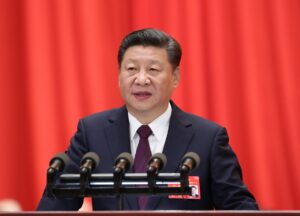
Ambassador Qi Zhenhong briefed the meeting on Sri Lanka’s vulnerabilities under the new tariffs. Following discussions, a special set of Chinese proposals has been handed to Colombo, with President AKD ordering a detailed review. China’s growing trade engagement with Pakistan and Bangladesh has already rattled India, raising the stakes for Sri Lanka’s regional diplomacy.
Indo-Lanka Relations under New Strain
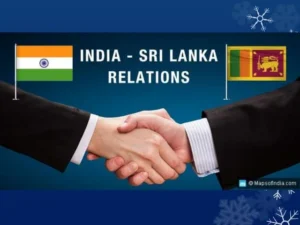
Adding to the complexity, questions have intensified over the contents of several agreements signed during Modi’s recent visit to Colombo. Cabinet Spokesperson Nalinda Jayatissa stated that India’s consent was required to disclose full details — a revelation that has only fueled public speculation.
One agreement — reportedly an Indo-Lanka defense MoU — has sparked fresh tension with China, particularly concerning access to Sri Lankan waters for Chinese research vessels. With regional security dynamics shifting, Sri Lanka’s balancing act between India and China is being sorely tested.
Former President Wickremesinghe Faces Legal Scrutiny
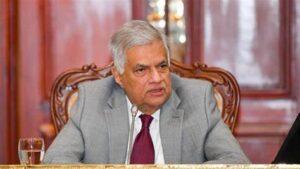
Back at home, former President Wickremesinghe found himself in legal hot water, offering a defense of Opposition MP Chamara Sampath Dasanayake, who is imprisoned over bribery charges. Wickremesinghe cited knowledge of Provincial Council finances during Dasanayake’s tenure as Uva Chief Minister.
Having missed a prior summons to the Commission to Investigate Allegations of Bribery or Corruption (CIABOC) due to holiday schedules, Wickremesinghe has now committed to appearing before the body on 28 April, awaiting the return of his legal counsel.
Government Launches New Anti-Corruption Units
In a separate development, the AKD Government is pushing ahead with its anti-corruption agenda, planning to set up internal affairs units within State entities. These units will be tasked with monitoring public sector integrity, reporting quarterly to CIABOC, and flagging potential corruption hotspots within each agency.
Election Campaigns Heat Up Post-New Year
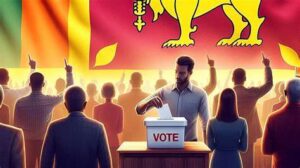
Meanwhile, Sri Lanka’s political engines are revving up ahead of the upcoming Local Government (LG) Elections. Following the New Year holidays, political parties have intensified their campaigns after the Court of Appeal dismissed around 60 writ petitions challenging nomination rejections.
The JVP/NPP alliance is riding a wave of optimism, with its General Secretary predicting a landslide victory, boasting expectations of securing around 70% of the popular vote.

